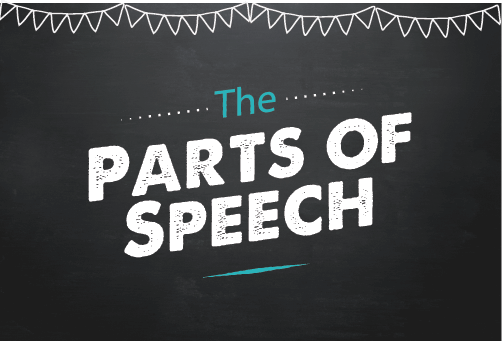English Parts of Speech

There are eight parts of speech in English: nouns, pronouns, adjectives, verbs, adverbs, prepositions, conjunctions and interjections. All English words fit into one of these word types. Some words can fit into more than one word type.
The parts of speech explain how a word is used in a sentence. (This is important to know because some words can be nouns, verbs or adjectives. For example: I saw him use the saw to cut the wood. Here, "saw" is used first as a verb and then as a noun).
This section provides a brief overview of each of the parts of speech and you can click on each type to get more detailed information, examples and practices exercises.
Nouns
Nouns are used to name people, animals, places, ideas or things.
Examples: car, elephant, Michael, Dr. Jones, girl, mailbox, China, philosophy
There are many different types of nouns: common, proper, abstract, concrete, countable, uncountable, singular, plural, collective, compound and possessive.
Pronouns
Pronouns are words that take the place (substitute for) nouns.
Examples: we, you, he, him, her, his, mine, yours, someone, these, those.
There are many different types of pronouns: personal, demonstrative, definite, indefinite, interogative, possessive, relative, reflexive and intensive.
Verbs
Verbs refer to the subject of the sentence and express actions, events, or states of being.
Examples: run, talk, be, eat, drink, play, think, go, find, believe, know, write, study
- I ran to the bank.
- He is 35 years old.
- They know how to speak French.
Adverbs
Adverbs modify or add information to verbs, adjectives and other adverbs.
Examples: very, quickly, soon, too, almost, rather
- She was very happy to receive the gift.
- I quickly ran to the bus stop.
- It was a rather hot day.
Adjectives
Adjectives describe what a noun or pronoun is like.
Examples: old, round, blue, funny, soft, five, excited, scared, intelligent, younger
- The old man is her grandfather.
- The scared dog hid under the glass table.
- She's an intelligent student.
Prepositions
Prepositions show the relationship between a noun or pronoun and another word in the sentence. Prepositions often show where the different things are located or positioned.
Examples: in, into, on, at, from, across, under, behind, above, below, between, over, around.
- The money is in the wallet.
- The customer went into the bank.
- The school is across the road.
Conjunctions
A conjunction is a word that links words and groups of words (phrases and clauses) together.
Examples: and, or, but, so, either, neither, nor, because, yet, after, when
- I like peanut butter and jam.
- I went to the store after I finished my homework.
- Would you like coffee or tea?
Interjections
An interjection is a word (or a few words) that express a feeling or emotion. When the feeling or emotion is strong, the interjection is followed by an exclamation point (!). When it isn't as strong, it can be followed by a comma.
Note: An interjection is not grammatically related to the rest of the sentence.
Examples: yahoo, hurray, rats, oh no, uh oh, oh, wow, ouch.
- Wow! I won $5,000 in the lottery!
- Uh oh, I forgot to pay my phone bill.
- Ouch! I accidentally bit my tongue.
This is a brief overview. For detailed information, click on any of the headings to go to more in-depth information about each of the parts of speech.
- Home Page ›
- Main Grammar Page ›
- Parts of Speech
